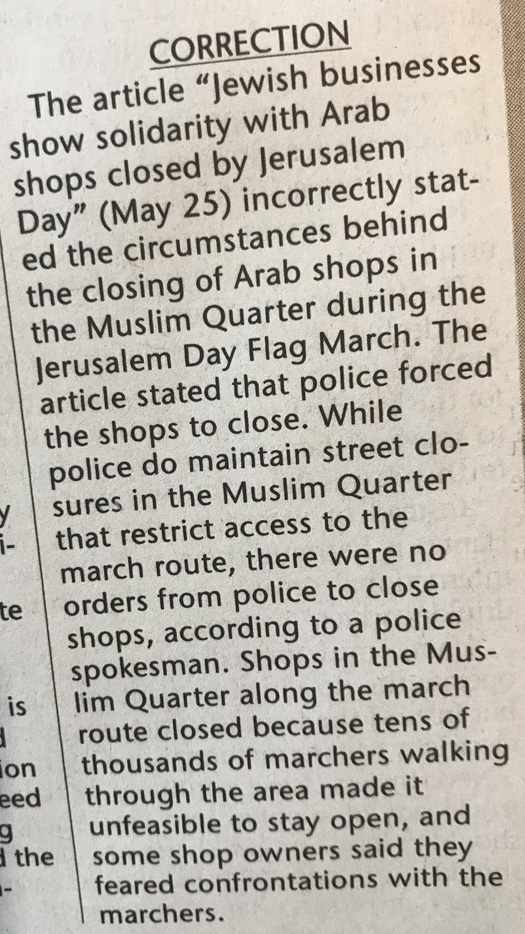The article explicitly erred, stating: “The police require shops along the march route to close in order to avoid conflicts and maintain order.” In addition, reinforcing the false notion that police ordered shopkeepers to shutter, the article quoted Noam Frankorter, one of the Jewish shop owners who closed in solidarity, as giving the confused statement: “I think [closing in solidarity] could have an influence. The police, instead of protecting the Palestinian business owners, who are exposed to violence toward them and their property, are forced to close [sic].”

CAMERA contacted The Jerusalem Post, noting that in call with CAMERA, police spokesman Micky Rosenfeld said that claims that the police ordered Arab shops to close are absolutely false. He maintained that shopkeepers opt to close their stores due to the lack of customers as the streets along the march route are completely clogged with Jerusalem Day revelers. (A closure was in place on some, not all, streets along the march route; it did not require stores to close, said Rosenfeld. In addition, according to Rosenfeld, some of the shopkeepers along the march route chose to remain open.)
The Jerusalem Post commendably published the following thorough correction in today’s print edition:
The article “Jewish businesses show solidarity with Arab shops closed by Jerusalem Day” (May 25) incorrectly stated the circumstances behind the closing of Arab shops in the Muslim Quarter during the Jerusalem Day Flag March. The article stated that police forced the shops to close. While police to maintain street closures in the Muslim Quarter that restrict access to the march route, there were no orders from police to close shops, according to a police spokesman. Shops in the Muslim Quarter along the march route closed because tens of thousands of marchers walking through the area made it unfeasible to stay open, and some shop owners said they feared confrontations with the marchers.
CAMERA continues to call on The Jerusalem Post to likewise correct the digital edition.
For additional Jerusalem Post
corrections prompted by CAMERA, please see here.
June 12 Update: Jerusalem Post Corrects Online Article
The Jerusalem Post today corrected the
digital article, changing the article in multiple places and appending a correction to the end.
Most significantly, editors replaced the false sentence which had stated that “The police required shops along the march route to close in order to avoid conflicts and maintain order.” The new language is: “Many shop owners decide to close their stories [sic] along the march route to avoid conflict.”
In addition, the article originally began stating by stating that Arab store owners “were forced to close shop on Wednesday for the annual Jerusalem Day March.”

The amended first paragraph states as of this writing that Arab store owners “decided to close shop on Wednesday for the annual Jerusalem Day March.”
In addition, editors commendably appended the following correction to the bottom of the article:
An earlier version of this article published on May 25, 2017 incorrectly stated the circumstances concerning closed Arab shops in the Muslim Quarter of Jerusalem’s Old City during the Jerusalem Flag Day March. The article stated that police forced the shops to close. While, police do maintain street closures in the Muslim Quarter area that restrict access to the march route, there were no orders from police to close shops, according to a police spokesman. Shops in the Muslim Quarter along the march route closed because tens of thousands of marchers walking through the area makes it unfeasible to stay open and some shop owners say they fear confrontation with the marchers.





